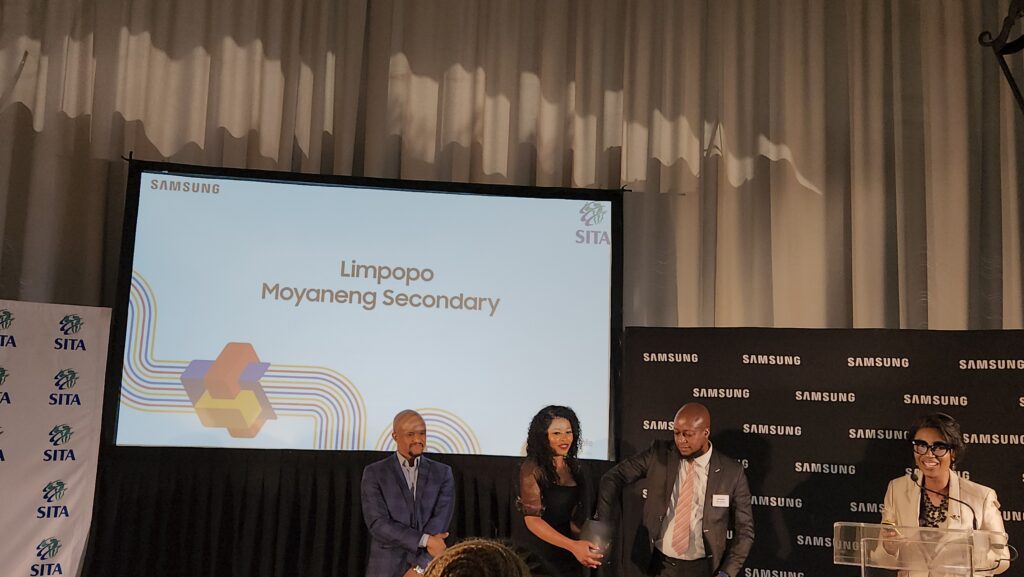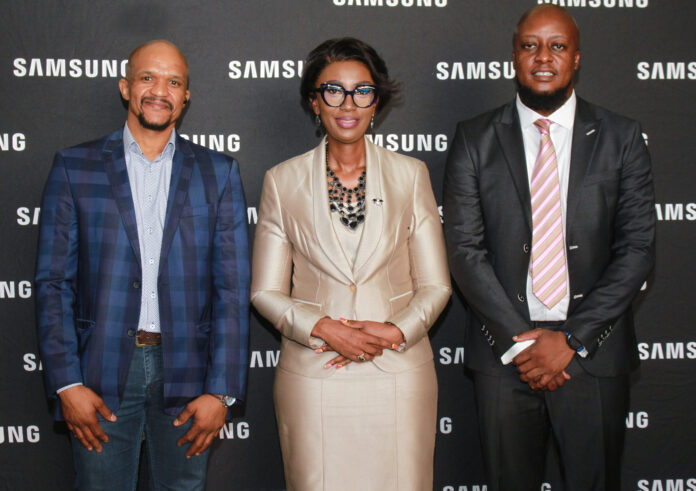The importance of STEM (science, technology, engineering and mathematics) education promotion in underserved communities was given a new positive spin at the recent launch of Samsung’s Solve For Tomorrow initiative in South Africa as the tech giant, together with SITA (State Information Technology Agency) took audiences into their confidence, stating that it’s through meaningful, synergistic efforts between the private sector and the government coming together and sharing responsibilities such as this, that envisaged positive results can be achieved.
“When we speak about realisable public-private partnerships, this is one of the ways through which they find meaningful expressions,” Tlali Tlali, head of corporate affairs at SITA said during the launch of the programme in Bryanston, Johannesburg, adding: “SITA entered into MOU with Samsung a few years ago, out of which we identified certain specific areas of collaborations. “In our environment, we have a flagship programme called GovTech, which is about working on solutions that enable government to work more efficiently and to deliver to the people on the ground. The other one is on SMME development, and the third one is on CSR (corporate social responsibility), which is what proudly brings us together here.”
The Samsung Solve for Tomorrow competition has – since 2010 – been challenging public school students to dream, develop and build real-world solutions to enact positive change. This programme has reached over 1.5 million contestants in more than 30 countries around the world by 2020.
This is the first time that Samsung South Africa, in partnership with SITA, is bringing the initiative to the country. With 51 pre-selected schools nationally in the first round, it’s aimed at giving grade 10 and 11 learners from underserved communities an opportunity to gain invaluable skills while solving pressing issues within their communities through Science, Technology, Engineering and Maths (STEM).
As Hlubi Shivanda, Director of Business Operations at Samsung South Africa explained during the launch, the initiative is focused on advancing STEM education, with organisations coming together to share responsibilities. “It’s a challenge to grade 10 and 11 to utilise STEM to solve societal challenges in the communities that they live in,” Shivanda added.
The next round of the competition entails a prototype development which will be funded by Samsung. Ultimately, top 3 schools will be announced as the winners at the end of the year.
Explaining Samsung’s long history of equipping African youths with in-demand technology skills, Shivanda had this to say: “1n 2016 we strengthen our focus in providing education solutions across Africa, not just South Africa, where we introduced the Samsung Engeering Academy program, and we partnered with the City of Tshwane, together with SITA to open the Air Conditioning Refrigeration Academy at the Tshwane North TVET College.
“The Samsung Engeering Academy was an initiative aimed at developing youths with skills for employability, made for impact across the continent and it helped our drive towards seeing investment within technology, and also get to where we’re today. We also invested in solar power internet schools and smart classrooms and innovation parks across the country. It is therefore befitting that an evolution of our CSR pillar programs gets us to where we get to challenge the students in the Solve For Tomorrow competition, to demonstrate how they can use technology to bring about positive change and impact communities in which they live. With Samsung committed to doing its bit to contribute to the development agenda and progress towards a prosperous South Africa, it’s initiatives like these that make it more critical to focus in investing in the youths of our country. I fervently believe that we’re going to empower even more young people, which will make the rest of the country proud, and puts us in a trajectory that will see us embracing technology to effect the much-needed change.”
Bridging the digital gap through impactful Public-Private Partnerships
SETA and Samsung has similarities in their CSR approaches, Shivanda further explained. “Historically we had invested in a lot of government schools across the country, they’ve done the same through their ICT labs rollout initiative. So when we form forces, we’re basically trying to find synergies that will bring expressions to this partnership that we signed an MOU of in 2020. Ultimately what we want to see is that the schools that have benefited from both the SITA and Samsung CSR initiatives be challenged to utilise them to solve problems in the form of Solve For Tomorrow competition.”
For SITA, the partnership speaks to the contributions all the parties involved need to make towards redressing imbalances of the past, and the resulting digital gap in education, which has been a central theme in democratic South Africa. If not addressed (the lack of access to technology in underserved communities), this puts South Africa in the risk of worsening inequality; after-all SA was declared the most unequal world in by the World Bank in 2019).
“The reality of the situation is that South Africa as a country has an unfortunate past, and this is part of the inequality which we can not shy away from,” Tlali adds. “We can not forget the past. We need to do something about it, and this partnership seeks to answer that question among other things.”
Elaborating more on the importance of this partnership, he says: “For us and Samsung to come together, it was, among other things, on the basis of the realisation that SITA for its part has made some investments in various communities, focusing especially on young people. In the last five years or so, we have rolled out 28 cyber labs in all the nine provinces, many of which form part of the 51 schools that are participating in this competition. In that light, it’s important that we understand what the basis of our partnership really is; the recognition that a foundation has been laid by one partner, and we now work together as we begin to build. These labs were established at a cost of R500 000 each. It is a small amount of money, and we would like to see ourselves doing a lot more of what we’ve done, and for us to achieve that, it is through collaborations such as the one we’re seeing happen today. It’s what we mean when we talk about meaningful public-private collaborations with impactful delivery.”

For schools who missed out on making it into the inaugural year of Solve For Tomorrow in South Africa, Samsung is looking into expanding the program going forward. “This year we started with just 51 schools because it’s the first time we’re doing it South Africa, and we wanted to get the lay of the land. But going forward, we’re going to increase the number of participants by opening it up to more schools in underserved communities across the country,” assured Lenhle khoza, transformation manager at Samsung SA.
Ssmsung Solve For Tomorrow; 2023 top 10 school finalists, winners prizes
The 10 selected schools who made it to the next round were announced on the day. Samsung is enabling learners from these schools by giving them funding for prototypes, taking them to a design thinking workshop and sponsoring every school with a Samsung tablet and data to help them do research.
The final stage of the competition will be an opportunity for each school to present the prototype of their solution to a panel of judges with the potential to win STEM equipment for their schools worth R100 000 (1st place), as well as R50 000 and R30 000 (2nd and 3rd places respectively).
In addition to the main prizes, each of the learners in the top three teams will be rewarded with a Samsung device.
Below are the Top 10 schools that have been selected:
| School Name | Province |
| Mbilwi Secondary School | Limpopo |
| Moyaneng Secondary School | Limpopo |
| Phendukani High School | Kwa-Zulu Natal |
| Adams College | Kwa-Zulu Natal |
| Umlazi Comprehensive Tech | Kwa-Zulu Natal |
| Rebatlathuto High school | Free State |
| Lekgarietsi High School | Free State |
| Maphuthaditshaba Secondary School | Mpumalanga |
| Phomolong Secondary School | Gauteng |
| Buhle Bemfundo Secondary School | Gauteng |

